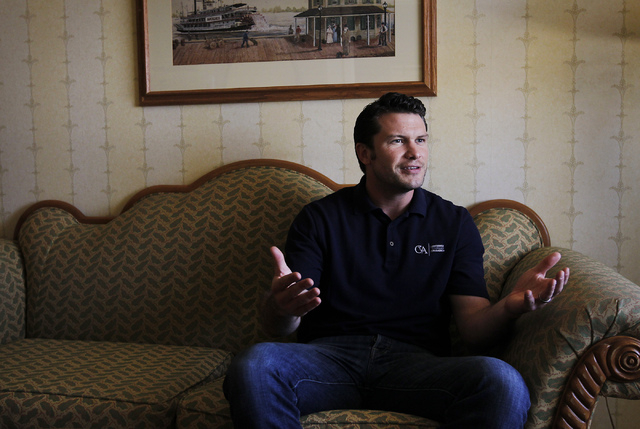Advocates call for Veterans Affairs reform

With their sights set on reforming the Department of Veterans Affairs, leaders of a nonprofit veterans advocacy group came to Las Vegas on Thursday night to launch the first of more than a dozen policy forums for their state chapters.
The intent is to heighten awareness about issues such as the slow processing of disability compensation claims.
“The problem is not only the backlog but the long waits, the coverups and the preventable deaths. And nobody is being fired for this, nobody’s actions are being held accountable and fired on the spot,” said Pete Hegseth, CEO for Concerned Veterans for America, which with the organization’s Nevada chapter held the forum, billed as Preserving Promises to Nevada’s Veterans.
Hegseth, an Army veteran of the wars in Iraq and Afghanistan, was joined onstage by the national group’s veterans affairs adviser Darin Selnick in addressing a crowd of 200 at the South Point.
Hegseth noted that there are “good employees in the VA, mountains of good employees, but they are stifled by bureaucracy.”
That is why he said Concerned Veterans for America is working with House Veterans Affairs Committee Chairman Rep. Jeff Miller, R-Fla., to promote legislation called the VA Management Accountability Act.
“We’re going to call on the VA to report more and disclose more,” Hegseth said. “The problem is no accountability, no transparency and no flexibility. That’s what needs to change.”
Selnick said based on his experience, when VA managers have been reprimanded for actions related to poor job performance the reprimands are only temporary.
“They fire people, then go ahead and rehire them,” Selnick said.
Selnick is a retired Air Force officer who worked as a special assistant to the secretary of veterans affairs from 2001 to 2009. He joined the group’s organizing committee because there are “a lot of good employees” who try hard to accommodate veterans. But, he said, their efforts are often compromised by a lack of accountability among VA managers and career employees.
The group launched a nationwide bus tour from Las Vegas in October to focus attention on the VA claims backlog problem.
The VA has been under pressure from Congress and Nevada’s delegation to reduce the backlog, especially at the VA’s Reno regional benefits office. The Reno office, which serves 250,000 Nevada veterans in addition to veterans in some California counties, has been among the worst in the nation for processing claims.
Earlier this month, Sen. Dean Heller, R-Nev., and five other senators called for actions they said would address a claims backlog that has proved challenging for the Department of Veterans Affairs to reduce, leading to long waits for decisions they said can devastate a veteran financially and emotionally.
Their bill was unveiled March 6 with a Senate report that detailed potential pitfalls that veterans face in seeking compensation for service-related injuries, and gaps in the VA’s handling of their claims. According to the agency’s latest weekly workload report, 686,861 disability claims are pending, with 403,761, or 59 percent, unsettled longer than the VA’s goal of 125 days.
The 45-page report by the Senate group provided the basis for the legislation and a primer on how the number of claims have grown through court rulings, new laws, the wars in Iraq and Afghanistan, and decisions by VA leaders that broadened the types of illnesses that qualify veterans for federal assistance.
The VA has struggled to keep its numbers current. Between 2005 and 2012, the agency increased its full-time employees in a bid to manage an increase in claims, with little improvement.
“Regardless of the increase in labor, the production per full-time employee decreased from 101.2 claims to 74 claims,” according to the report. “Further the average days to complete claims increased from 177 days in 2006 to 262 days in 2012 per full-time employee.”
Performance by VA regional claims offices has varied widely. The VA’s Reno benefits office ranked as the slowest at 425.9 days. The Reno office serves the entire state of Nevada.












